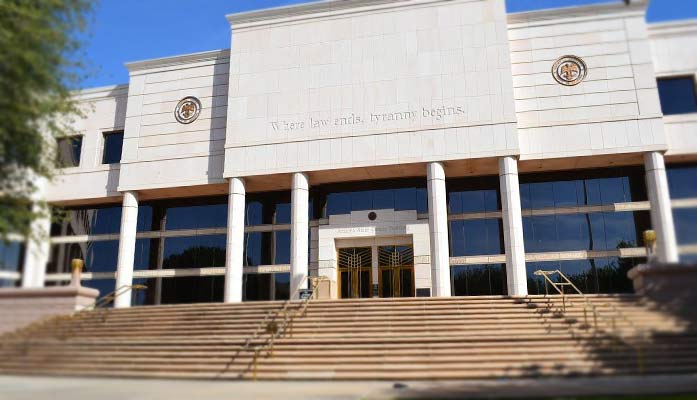By Terri Jo Neff |
How to interpret changes enacted in 2011 to Arizona’s development impact fee law will be heard by the Arizona Supreme Court, it was announced last week.
At issue is Arizona Revised Statute 9-463.05 which was amended in 2011 to redefine the circumstances under which a municipality can lawfully assess development impact fees. The Legislature noted its intent that courts would “narrowly” construe a town or city’s privilege to assess development fees.
Specifically, the 2011 version of ARS 9-463.05 prohibits impact development fees on new residents to pay for “a burden all taxpayers of a municipality should bear equally.”
In 2018, the Southern Arizona Home Builders Association (SAHBA) sued the Town of Marana after town officials spent more than $16 million in 2013 to acquire a water reclamation facility formally operated by Pima County. At the time, the facility only had capacity to serve current residents.
Marana then spent more than $17.5 million as part of a multi-phase Capital Improvement Project (CIP) to expand, upgrade, and modernize the facility, including compliance with environmental regulations. 20-year bonds were issued to cover the costs, with bond payments coming from impact fees charged on new homes and other development projects.
SAHBA’s lawsuit contends the expansion of the water reclamation facility and other upgrades undertaken as part of the project benefitted all existing residents as well as new residents. As a result, much of the impact fees violated ARS 9-463.05, the lawsuit argued.
The town, however, contended there was already sufficient water resources and wastewater treatment capacity to serve existing residents. It only acquired the Water Reclamation Facility and expanded the facility in order “to meet the needs” of future development, town attorney’s argued.
Marana also argued the project was developed “over years of careful consideration” by engineers, consultants, the public, and the Town Council. SAHBA was among the stakeholders involved in a planning process which started years earlier but took no action until 2018, according to town attorneys.
A Pima County judge and later the Arizona Court of Appeals sided with Marana’s position. Attorneys for the town later argued that review by the Arizona Supreme Court is “unwarranted” because the two lower court ruling were rightly decided.
“The trial court and the court of appeals evaluated whether the Town’s impact fee ordinances met the statutory requirements under A.R.S. § 9-463.05,” Marana’s response stated. “Both courts held the statutory requirements were met.”
But on April 5, the Arizona Supreme Court announced it will take up the case later this year, representing the first time the amended law will be subjected to review by the justices. The questions to be addressed during oral arguments are:
- Did Marana violate A.R.S § 9-463.05 by making future development bear 100 percent of the cost of acquiring the Facility?
- Did Marana violate the same statute by making future development bear nearly all of the cost of upgrading, modernizing, and improving the Facility?
- Did Marana further violate the statute by failing to take into account what could or could not be included in development fees under that statute, and by failing to make any proportionate allocation of costs between existing and future development?
The Home Builders Association of Central Arizona, which is a trade association representing nearly 500 member companies engaged in residential construction and development, filed an amicus curiae (friend of the court) brief in support of SAHBA’s case.








